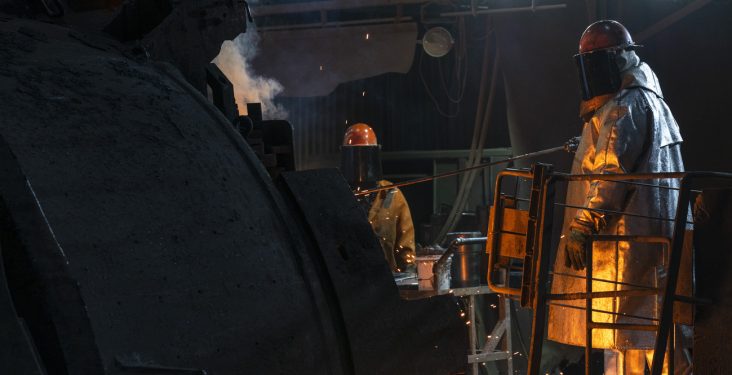Steel workforce an advantage for Northeast Arkansas, panel says
by January 13, 2025 2:46 pm 1,323 views

U.S. Steel factory workers.
Mississippi County produces more steel than any other in the United States and that trend is likely to continue into the future, steel stakeholders said during a panel discussion at the Catalyst: NEA Economic Development and Leadership Forum recently held in Jonesboro.
The availability of water, inexpensive electricity, proximity to the Mississippi River, railroad and highway access are among the primary reasons the industry has thrived in Northeast Arkansas, Patrick Schueck, CEO at Lexicon, said. But the main reason for industry health is the workforce, Schueck added.
“We have installations in 15 states. … I’d put the workforce in Northeast Arkansas up against anybody,” he said.
Nucor-Yamoto Steel Vice President and General Manager Zach Moon agreed with Schueck. He started in the steel industry in 1998 and spent 17 years in Northeast Arkansas. He moved away and then came back and was shocked at the changes. The technology used in the plants and the skill level of the workers rapidly improved, he said.
“It’s so quick and so fast,” he said about the advancements in the industry.
U.S. Steel Senior Vice President of Advanced Steel Making Dan Brown said his company looked at 47 sites around the country to build a new steel mill. That got pared down to seven and eventually they decided to build Big River II one mile from the original Big River Steel mill. The factors that led them to buy Big River in the first place led them to build another plant here and the main thing was the workforce, he said.
“Big River Steel is the best investment in the history of U.S. Steel. … This is by far the best workforce I’ve been around,” he said.
Part of the workforce development involves colleges and universities in the region including Arkansas State University and Arkansas Northeast College. ANC has developed numerous classes and programs to train steelworkers, President Chris Heigle said. The curriculum used comes from industry partners and the college seeks input from retired workers from the steel industry. The students that graduate from these programs fast-track to high-paying jobs in the industry and it’s a boon to the local and regional economy.
“I don’t know a steel worker that’s unhappy,” he said.
After ASU Chancellor Dr. Todd Shields was hired almost two years ago, Brown invited him to visit Big River Steel. Shields told the crowd he was expecting a scene from the movie “Rudy,” but was surprised. There weren’t workers shoveling coal into furnaces.
“I couldn’t believe how high-tech it was,” he said.
Innovations in the industry and rapid use of robots and AI are coming at faster clips, Schueck said. At the company’s plant in Blytheville, they’ve got several robotic lines in operation and more are on the way, he said. He scoffed when people told him they’d lose their workforce.
Robots work continuously, but it still takes many human workers to keep systems up and running, he said.
“We have the best fabrication process in the world,” Schueck added.
Along with technological innovations, the steel industry has developed many environmentally-friendly practices in recent years. Moon said one of the main reasons Nucor was founded was to produce environmentally-friendlier steel.
“We look every day for greener practices and greener inputs,” he said.
Brown noted that the first time he came to Northeast Arkansas he saw no signs of the steel mills. The signature billowing smokestacks are a thing of the past, he added.
Skilled labor such as engineers, welders, machinists, electricians and others will always be needed in the industry and there is never enough skilled labors, all the speakers said. Schueck added that one reason the workforce is good in Northeast Arkansas is that many come from a farm background.
“People here know how to work hard and know how to use equipment,” he said.
